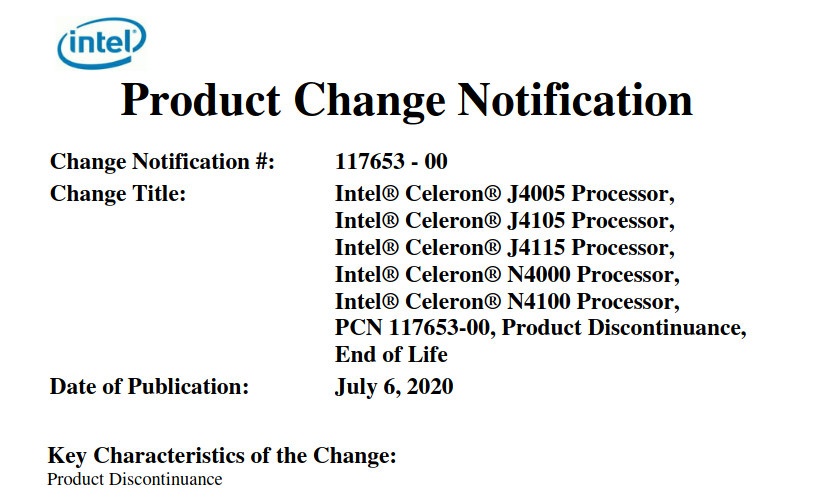Intel Gemini Lake low power processors based on Goldmont Plus architecture were announced in 2017 as successors of Apollo Lake family with the official launch in 2018 fairly quickly followed by a supply shortage… But the processors have still been used in plenty of sub-$250 mini PCs, and some SBCs like ODROID-H2 or ODYSSEY-X86J4105, as well as a few laptops.
More recently, the company announced Gemini Lake Refresh family, but to my surprise, Intel has already issued several product discontinuance notices for the several Gemini Lake (Refresh) processors.
Affected Gemini Lake processors include:
- PCN117653-00
- Intel Celeron J4005, J4105, J4115
- Intel Celeron N4000, N4100
- PCN117657-00
- Intel Celeron Processor N4000C
- Intel Pentium Silver J5005, Intel Pentium Silver N5000
Intel has two end-of-life notifications because the schedule is slightly different:
- PCN117653-00
- Product Discontinuance Program Support Begins: July 6, 2020
- Product Discontinuance Demand To Local Intel Representative: October 9, 2020
- Last Corporate Assurance Product Critical Date: January 11, 2021
- Last Product Discontinuance Order Date: January 22, 2021
- Orders are Non-Cancelable and Non-Returnable After: January 22, 2021
- Last Product Discontinuance Shipment Date: July 9, 2021
- PCN117657-00
- Product Discontinuance Program Support Begins – July 6, 2020
- Last Corporate Assurance Product Critical Date – October 9, 2020
- Last Product Discontinuance Order Date – October 23, 2020
- Orders are Non-Cancelable and Non-Returnable After – October 23, 2020
- Last Product Discontinuance Shipment Date – April 2, 2021
That gives plenty of time for manufacturers to request for more supply, and even after end-of-life of those Gemini Lake processors. It may still be an issue for people wanting long term support. For example, Hardkernel recently switched from Intel Celeron J4105 in ODROID-H2 to Intel Celeron J4115 “Refresh” in ODROID-H2+, but both are being phased out. So if you expected to purchase ODROID-H2(+) boards beyond 2021 it may become an issue depending on how much stock Hardkernel is ready to have.
What’s surprising about this product discontinuance is that the successor of Goldmont Plus architecture, Tremont architecture has not found its way into other low-cost processors yet, and only Intel Core i3/-5 Lakefield processors. So either we should expect an announcement about Elkhart Lake processors soon, or Intel has decided to drop the low-power, low-cost – and likely low margin – mini PC market. I remember a few years ago, when it was easy to find Intel mini PCs for less than $100, but recently it’s been close to impossible with starting price closer to $150. If Intel decides to go away with “Atom-class” Celeron/Pentium processor, the low-cost Intel mini PC/SBC market will be closer to $300. Hopefully, it won’t happen, as an Elkhart Lake processor has been spotted in 3DMark benchmark last May.
Via Anandtech, and thanks to Linuxium for the tip.

Jean-Luc started CNX Software in 2010 as a part-time endeavor, before quitting his job as a software engineering manager, and starting to write daily news, and reviews full time later in 2011.
Support CNX Software! Donate via cryptocurrencies, become a Patron on Patreon, or purchase goods on Amazon or Aliexpress





